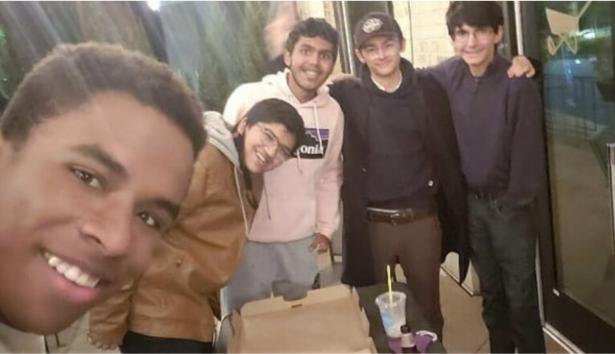When 17-year-old Georgia students Edward Aguilar, Jordan Umusu, Sahan Reddy, and Michael Giusto founded the website Students For 2020, they wanted to provide a place that would not only help college students register to vote but also help them determine which state their vote would matter most in. With many students having dual residency, the choice is often theirs to vote at home or in their college towns. “We kind of like to think of it as reverse gerrymandering,” Aguilar said in a recent interview with Daily Kos.
It worked. They ended up registering more than 65,000 students nationally for the 2020 presidential election and 17,000 students in Georgia alone by sharing their website in college email threads and group chats. It was the kind of showing of force with young people that grassroots efforts throughout the state have embraced. Now, Aguilar, Umusu, Reddy, and Giusto have their eyes on getting 40,000 new student voters registered and flipping 60,000 students planning to vote for Republican Sen. David Perdue in Georgia’s upcoming runoff.
The runoff is Jan. 5. Click here to request an absentee ballot. Early in-person voting starts Dec. 14. And REGISTER TO VOTE here by Dec. 7.
“Our goal is to flip these elections entirely through the student voting bloc [given that the mass majority of the incoming waves of political funding will be targeted to the older demographics,]” Giusto said in an email to Daily Kos. His organization, which recently launched a new website with the goal of attracting more young people to government service overall, is focusing in part on more than 23,000 17-year-olds in Georgia. They’ll be turning 18 between November 3 and January 5 and eligible to vote for the first time in the Senate runoff. It’s a demographic that youth-focused organizations throughout the state are focusing on from Campus Vote Project efforts at Historically Black Colleges and Universities to the youth empowerment movement Opportunity Youth United.

Kimberly Pham, Shanice Turner, and Shaquana Boykin (left to right) are at an Opportunity Youth United voter registration event Sept. 22 in Atlanta.
The ladder has registered 85 people in the last year and held more than 50 events this year alone both virtually and in person, including a voter registration day held in the underserved and overlooked southwest Atlanta community of Pittsburgh, youth advocate Shanice Turner said in an email to Daily Kos. Her focus has been on voter mobilization, education, registration, and voting suppression release
“Sadly, voter suppression in Georgia is real,” Turner said in an email to Daily Kos repeating the words of ACLU of Georgia Executive Director Andrea Young. The nonprofit filed a lawsuit naming then-Secretary of State Brian Kemp for “wrongly purging 160,000 registered voters from the active voter rolls” in 2017 and trying to close polling locations in predominantly Black communities in Atlanta. Turner highlighted southwest Atlanta and south DeKalb County. “Voting is not seen as a solution or as a resolution to many of the issues that we have in our communities,” Turner said. But it is, she added.

Tenisha Williams is pictured at Opportunity Youth United's National Voter Registration Day Sept. 22, 2020, in southwest Atlanta.
Aguilar, a senior at the highly ranked Alpharetta High School about 30 miles north of downtown Atlanta, said his organization struggled at first to figure out "how in the world" it was going to reach young voters. Social media sites have started veering away from political ads, and the high school age group doesn't really watch TV, he said. So organizers had to get a bit more creative especially during the coronavirus pandemic, which has forced school doors closed. Aguilar, who is also chief executive officer of the charitable organization Paralink making personal protective equipment for Atlanta hospitals, said now he is reaching students via political clubs. “If we know they're Democrats, we ask them to help us,” he said. He asks students to be "captains" and mobilize five to 10 people at their high schools to vote. If the students are Republicans, Aguilar takes the time to talk to them, sometimes for 45 minutes or an hour. “We have these conversations as carefully as possible," he said.
Having recently discussed different techniques with a political science professor at Columbia University, Aguilar said he isn't trying to persuade students to change their beliefs but he's trying to get them to understand how his candidate is in fitting with what they believe. "I think at the core we believe in the same issues," he said.
Christina Williams, a Campus Vote Project Democracy fellow at Clark Atlanta University, said in the recent election her organization emailed every student directly about registration deadlines, sending links to request ballots. She also sits in on virtual classes, drops links for students to register, and gives them 2 minutes to register on the spot as an intern with the progressive advocacy nonprofit Public Citizen. "I’ve always kind of known that my own voice was powerful,” the West Philadelphia native said. She tries to make sure other young voters feel that way too. "Too often it’s vote because I want you to vote," she said of social media messaging targeting young people.
Williams, 20, said what’s more important is keeping messaging short and to the point and listening to understand young voters “not to push your own issue." “There’s this idea that young people aren’t doing anything. That's not true," Williams said. In the middle of a pandemic, people are working and taking care of their families. Students are balancing online classes and final exams. They don’t have a lot of free time, Williams said.
Aguilar touched on similar misconceptions about young voters. “People think students are apathetic, but the truth is a lot of them are just disillusioned,” he said. They don’t know their power, but they’re learning.
Lauren Floyd is a Daily Kos staff writer.


Spread the word